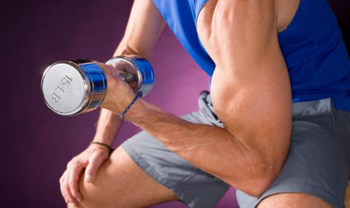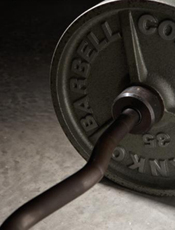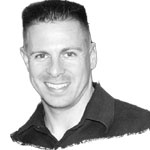Should I Be Sore After Weight Training?
by Marc David

It’s long been a myth that if you didn't get sore from your last workout, then you didn’t work hard enough and you probably didn't improve. But it's just a myth. Soreness is not an indicator of a successful workout.
Muscle soreness that occurs directly after a workout is known as acute muscle soreness. Muscle soreness that appears 12 to 48 hours after exercise is known as delayed onset muscle soreness (DOMS) or post exercise muscle soreness (PEMS).
Acute muscle soreness or inflammation can last up to an hour after exercise and can be caused by a reduction in normal blood flow to the muscle and a build up of metabolic byproducts like hydrogen ions or lactic acid.
The physiological mechanisms that cause DOMS or PEMS are not completely understood but the leading hypotheses are: (1) the Connective Tissue Damage Hypothesis, (2) Skeletal Muscle Damage Hypothesis, and (3) The Spasm Hypothesis.
Connective Tissue Damage Hypothesis.
In a 1997 study, Brown, Child, Day and Donnelly reaffirmed an early study done by Abraham suggesting that DOMS or PEMS is due to a disruption in the connective tissue of the muscle and tendinous attachments.
Skeletal Muscle Damage Hypothesis.

In a 1986 study, Clarkson et al found that serum creatine kinase concentration was elevated with concentric, eccentric and isometric contractions, with greater perceived muscle soreness associated with the eccentric contraction. In a 2000 article entitled “Effects of Plyometric Exercise on Muscle Soreness and Plasma Creatine Kinase Levels and its Comparison with Eccentric and Concentric Exercise” (The Journal of Strength and Conditioning Research: Vol. 14, No. 1, pp. 68–74), the authors found Clarkson’s study not only proved to be true but also concluded that plyometric activities had incurred perceived muscle soreness than concentric contractions.
Spasm Hypothesis.
In a 1980 study, Devries proposed that DOMS or PEMS is due to a restriction in blood supply, generally due to factors in the blood vessels, with resultant damage or dysfunction of tissue called ischemia. As you continued to workout, further ischemia would result in more damage and "soreness." This theory was further proven by work done in 2000 by Barlas, Walsh, Baxter, and Allen.
Sources: ISSA Complete Guide to Fitness: Edition 8.1.5, Unit 15, pp. 415
DOMS or PEMS seems to be a side-effect of muscle tearing and repairing that occurs after a workout. It's an unfortunate side-effect as well because you are very sore and it takes 2 or more days for the soreness to go away. Soreness should not be a goal of training. Many people experience soreness when they do a particular exercise with a moderate to heavy weight and get a good, deep stretch. Not every person experiences muscle soreness. In fact, many do not yet they continue to make fantastic progress.
Forget soreness as an indicator or progress and use the most underutilized piece of equipment in the gym to tell you EXACTLY where you are, where you've been and if you are making forward movement.
What's the piece of equipment?
A training journal!
Your goal should be to improve on your last efforts. Getting a little bit better with each step and each workout. If you track your progress in some type of journal, it’s easy to see if you are improving. It's even more beneficial to track some of your body measurements (fat loss, weight gain, size on arms and legs).
Use your journal to track your progress and your perception of how you feel. When you are done with a workout, you should feel better. Not so fatigued you can’t drive home. And not puking or so nauseous that it's difficult to impossible to eat post-nutrition foods. You want to push yourself and get better but blasting yourself to the point of fatigue and overtraining where you are tired 2 days later or getting so sore it takes 7 days to walk again, is not good training. It will affect your recovery and that ultimately affects your next workout like a domino effect.
Soreness is not an indicator of a good workout. That myth has been around forever. Getting tired is easy. Getting better is not. I’ve never seen any proven scientific results that says soreness is a must in order to get better or stronger or bigger.
Copyright 2006 Marc David
About The Author:
 Marc David is an innovative fitness enthusiast and the creator of the "The Beginner's Guide to Fitness And Bodybuilding" method on www.Beginning-Bodybuilding.com. He can show you how to reduce your body fat thru diet, how to gain weight or create more muscle thru an abundance of workout tips by training LESS! Not more. He dispels many "bodybuilding myths", tells you what most people never realize about nutrition, and what the drug companies DON'T WANT YOU to know. Go to: http://www.Beginning-Bodybuilding.com to find out more about The Beginner's Guide to Fitness And Bodybuilding.
Marc David is an innovative fitness enthusiast and the creator of the "The Beginner's Guide to Fitness And Bodybuilding" method on www.Beginning-Bodybuilding.com. He can show you how to reduce your body fat thru diet, how to gain weight or create more muscle thru an abundance of workout tips by training LESS! Not more. He dispels many "bodybuilding myths", tells you what most people never realize about nutrition, and what the drug companies DON'T WANT YOU to know. Go to: http://www.Beginning-Bodybuilding.com to find out more about The Beginner's Guide to Fitness And Bodybuilding.
More Articles by Author Marc David
Return to the Workout Articles Archive
|